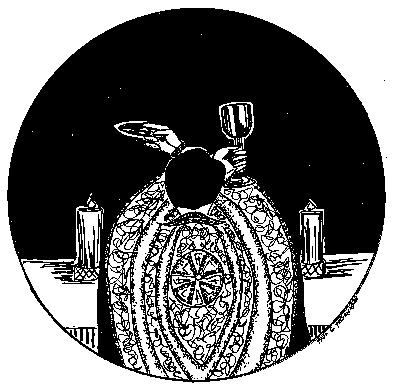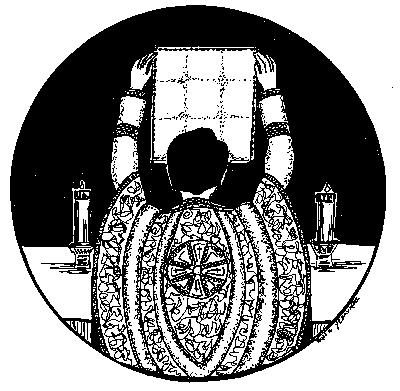
|
|
The Holy Spirit & The Divine Liturgy
 At
the beginning of the Divine Liturgy we ask the Holy Spirit to be present with
us: "Heavenly King, Comforter, Spirit of Truth, Who are everywhere present
and fill all things, Treasury of Blessings, Bestower of Life, come, and dwell
within us; cleanse us of all that defiles us, and, O Good One, save our souls."
At
the beginning of the Divine Liturgy we ask the Holy Spirit to be present with
us: "Heavenly King, Comforter, Spirit of Truth, Who are everywhere present
and fill all things, Treasury of Blessings, Bestower of Life, come, and dwell
within us; cleanse us of all that defiles us, and, O Good One, save our souls."
Several
times in the Liturgy the good and life-giving Holy Spirit is invoked along with
the Father and Son.
After the Great Entrance the priest
prays "Make us worthy to find favor with You so that our sacrifice may be
acceptable to You and so that the good Spirit of Your grace may rest upon us,
upon these gifts present before us, and upon all Your People."
The
priest also requests, together with the grace of our Lord Jesus Christ, the love
of God the Father, and "the fellowship of the Holy Spirit" will be
with all of us.
Immediately after the consecration, the
priest prays: "We ask, we pray and we entreat You: Send down Your Holy
Spirit upon us and upon these Gifts here present. And make this Bread the
precious Body of Your Christ. And that which is in this chalice the precious
Blood of Your Christ. Changing them by Your Holy Spirit."
Where
will the Spirit be sent? "Upon these Gifts here present." The
transformation of the bread and wine into the Body and Blood of our Lord God and
Savior, Jesus Christ is not some work of priestly magic. The text of the
Liturgy declares: "Changing them by Your Holy Spirit."
This
change, which is the response God offers to our prayer, is not an end in itself.
It is accomplished so that the Body and Blood of Christ "may be for the
communicants sobriety of soul, fulfillment of the kingdom of heaven, confidence
before You and not for judgment or condemnation." All is accomplished by
the Spirit and in the Spirit.
We need to note that the
priest requests: "Send down Your Holy Spirit upon us and upon these Gifts
here present." He does not ask that the Spirit come first upon the Gifts,
but that He come in the first instance upon us. This is the moment of Pentecost
in the Eucharistic liturgy.
We need the Spirit to descend
into our hearts even before He descends upon the material elements of bread and
wine that have been offered and consecrated.
Let us
realize the significance of this inner Pentecost. Let us in this moment truly
experience the presence and power of the Spirit given to us. The power of the
Holy Spirit that changes our offerings into the Body and Blood of Christ, will
change us also into Christ.
 By the Breath of the
Spirit
By the Breath of the
Spirit
The holy gifts of bread and wine are brought to the holy
altar during the Great Entrance of the Divine liturgy. The celebrant along with
the laity prays that we may be of one mind and one heart. We are called to love
one another as we confess our faith.
As the faithful
prayerfully and reverently begin to recite the Nicene Creed, the priest takes
the largest of the veils that has covered the holy gifts and begins to wave it
slowly. This gesture acquired a profound spiritual meaning. The waving of the
veil above the bread and wine came to be seen as an image of the presence of the
Holy Spirit, as the divine breath or "wind" that filled the house at
Pentecost (Acts 2: 2).
Proclaiming the words of the
Confession of Faith can be done only in an authentic way if the Holy Spirit "breathes"
upon us, inspiring us and filling us with love. The mere recitation of words is
meaningless. We may read the doctrinal formulas, but without the Spirit the act
will be sterile, a dead ritual.
May the Holy Spirit come,
then, to quicken and give life to the words we proclaim. The Confession of Faith
begins with the words: "I believe." What does it mean to believe? To
believe is trusting in a love and a power beyond ourselves. Belief requires an
authentic act of faith, accomplished under the influence of divine grace. Belief
is concerned with revealed truths which are inaccessible to reason alone. We can
express belief only in an attitude of trust and obedience that is a response to
love.
Wisdom Speaks
| St. John Chrysostom in his sermon on Pentecost holds up before us some of the accomplishments of the Holy Spirit as follows: | "For there was a tax collector, and he was transformed into an evangelist. There was found a persecutor, and he was changed into an apostle. There was a robber, and he was led into paradise. There was found a prostitute, and she was made the equal of virgins. There was found wise men, and they were taught the Gospels. Evil fled away, and gentleness took its place. Slavery was put away and freedom came in its stead. And all debts were forgiven, and the grace of God was conferred. Therefore heaven became earth; and from repeating this again and again I shall not cease." |
Master Where Do You Live?
Rabbi (which means Teacher), where do You stay" (Jn1:
38)?
The question John and Andrew asked of Jesus is one we
often direst to God each day. "Rabbi, where do You stay? Where can we find
You?" God Himself answered this question in the mystery of the Incarnation.
He became man in Jesus Christ. "The Word became flesh and made His dwelling
among us, and we have seen His glory: The glory of an only Son coming from the
Father, filled with enduring love" (Jn1:14).
When
Mary bent over the crib in Bethlehem, God was there! For 33 years of human
history it was possible to point to Jesus and say: "There is God!"
Where does God live for us? Where can we find You now?
Pointing to the consecrated bread and wine in the Holy Eucharist, He says to us:
"Come and see." (Jn 1: 39) "This is my Body ..." (Lk 22:
19). This cup is the new covenant in my Blood..." (Lk 22: 20). He who feeds
on My flesh and drinks My Blood has life eternal, and I will raise him up on
the last day" (Jn 6: 54).
"Rabbi, where do You
stay?" Come and see, He says, as He invites us to look into ourselves,
into our own souls. It is there that He has chosen to dwell. "That Christ
may dwell in your hearts by faith," says St. Paul (Eph 3:17). The word
used is "dwell" not "pay a visit." He wants to settle down
there, live there the year round.
Christ Who had "nowhere
to lay down His head" seeks to make His home in us. This is why He has
chosen to come to us so simply and yet so mysteriously under the forms of bread
and wine. "Abide in Me and I in You."
"Rabbi,
where do You stay?" "In you! " He says. You have been outfitted
to contain God. You are God's temple. He waits to take up residence in us. He
has claimed us as His children. He will not rest until He invades our heart,
and makes it His throne.
|
What exactly do we believe? We believe in one God, the Father, the Almighty, maker of
heaven and earth. We glorify His purposes for the created world, for every
element of the universe and for the future restoration in Christ of the world
which the fall of humanity has plunged into the captivity of evil. We do not
attribute to God who is pure light and love any of the evils of this world. God
struggles with us against evil, the rebellion of a power that has become a power
of darkness. Prayer to the Holy Spirit Holy Spirit, Paraclete, think through me, love through me. forgive through me, work through me, reach out through me, encourage through me, so that Your thoughts become my thoughts, Your love becomes my love, Your forgiveness becomes my forgiveness, Your power becomes my power. Amen. |
A diamond assessor has a difficult job. Surrounded by dozens of trays of finished diamonds, he has to determine their value and place them in a tray marked with a certain price. One day an assessor was asked: "How is it that you can look all day at hundreds of diamonds without becoming confused? How do you maintain your sense of values? The assessor smiled, happy that his task was taken so seriously. "It's very simple, my friend," he replied. Holding out his hand, he pointed to a fabulous diamond ring on his finger. "This diamond is perfect," he said. "It doesn't have a single flaw. Every half hour or so, I put it under my eyeglasses. This perfect diamond restores my sense of values and keeps me keenly aware of the perfection required of these gems." Grandma says that what that flawless diamond is for the assessor, the Lord Jesus is to us. By looking constantly at Him and measuring all things in the light of His perfection and His commandments, we keep a sense of what is truly important and what is not. Christ is the perfect Son in Whom the Father is well pleased. The Holy Spirit will guide us as He guided Jesus to determine what is right and what is wrong, what is worth giving our lives to and what is not, what deserves our allegiance and what does not. |
Who Am I?
We need to recapture the meaning of what it means to be
made in the image of God. We need to actualize the image of God in us.
We
need to say to ourselves: "I am not a consumer I am not an idiot. I am not
a receptacle for drugs. I am not a glorified animal. I am not a container for
alcohol. I am not a playboy or playgirl. I am a living icon of God created in
His own image. I am a Temple of the Holy Spirit. I am made to house God.
If
I am a living icon of God, so is everyone else. Mother Teresa said very aptly: "If
everyone could see the image of God in His neighbor, do you thing we should
still need tanks and generals?" The tragedy is that we don't see God either
in ourselves or others.
| Go to Seminary's Home Page |
These
pages were designed by: MarMaPhASMaNaJ (© 1997 by Stamford Eparchy) |
Go to Eparchy of Stamford |